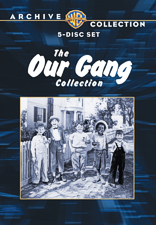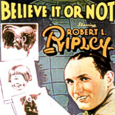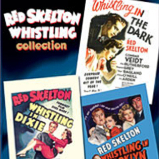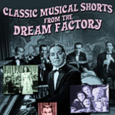 Metro-Goldwyn-Mayer (1938-1944), Warner Home Video (September 1 2009), 5 disc set,
Metro-Goldwyn-Mayer (1938-1944), Warner Home Video (September 1 2009), 5 disc set,
572 mins, 1.33:1 original full frame ratio, Dolby Digital Mono, Not Rated (see packaging
note below), Retail: $34.95 (available online only from the Warner Archive Collection)
The Movie:
The demise of the short subject since the collapse of the Studio System and their monopoly on the movie theater chains is well and truly to be lamented. Not that we also lost the guaranteed addition of an animated cartoon on the bill, as well as often very entertaining second features (or “B-Movies”), but the “filler” segment of an evening’s program always meant ten or so minutes in the company of an accomplished comedian or comedy troupe.
One or two reelers had always been part of the bill in the silent days, but as sound came into fashion, the vogue slipped from the vaudeville act recordings of the early talkies to a variety of dramatic and comedy short films: miniature versions of the films that were a centerpiece to an evening’s entertainment.
With stage acts drying up, many of the old-school comedians made their way to the screen in these shorts, and new names appeared in them before going on to feature careers of their own. Some established stars, such as Laurel & Hardy, were able and willing to straddle silents and sound, shorts and features, while others who had not made the transition from silent to sound as easily, like the great Buster Keaton, also found a home in these kinds of productions.
Often sidekicks from other series would find themselves front and center, with the likes of slapstick stooge Edgar Kennedy the star of his own run of shorts, and other names as Leon Errol, Joe McDoakes and Robert Benchley turning simple ideas into several minutes of hapless mirth.
With time short, and money often shorter, these films became the prototype for the situation comedies that would later appear on television and indeed, many of these films found a later natural home on the small screen, which is unsurprisingly where I first encountered them. Often I would try and catch these films and commit them to home video, jumping up at the crack of dawn in the hope of building a library of such shorts. One would have hoped that the advent of DVD would have made such things redundant, but it’s only now, with Warner Bros. opening their vaults for the ongoing Archive Collection, that serious fans of these films can start to add them to their shelves in official editions.
With some of those named series above hopefully on the horizon, our attention turns for this review to Buckwheat, Froggy, Alfalfa, Darla, Waldo, Porky, Spanky, Spike, Percy, Woim and Butch, perhaps better known as The Little Rascals after television syndication of their early silent films. Originally produced by the legendary Hal Roach from 1922 until 1938, the Our Gangs featured a group of “poor” kids who continually found themselves in a series of misadventures.
A series strong point was the natural performances that were pulled out from the young cast, a trait that continued over the years through different cast members. Roach switched distribution to MGM in 1927, the Studio boosting the series’ popularity by adding sound two years later. Finding that the Studio-owned theaters block booking made preference to their own product, Roach produced a 1936 full-length film, General Spanky, designed to take the rascals into features but it only proved to show audiences preferred the short film format for the characters.
In 1938, Roach abandoned the series, selling the rights lock stock and barrel to MGM, who continued to make the films in-house, the results being the 52 shorts featured in this collection. At Hal Roach’s, the films had always enjoyed some of the cream of the pool of comedy shorts writers and directors working in Hollywood (including James Horne, James Parrott, Walter Lantz, Leo McCarey, Frank Capra, Charley Chase and Frank Tashlin), and the same approach continued at MGM. Future headliners George Sidney and Cy Enfield are names to look out for, but the star attractions are the kids themselves. The focus was always to have them act naturally, and this is a big plus in the series, since the Our Gang films undoubtedly would never have been as popular had the kids come across as Hollywood brats.
In the America of the great depression, the fact that these children were normal, not especially well off kids, was also a big draw: those of a similar age or otherwise in the audience could identify with their adventures, which invariably concerned them imagining themselves in better off situations or pulling pranks and stunts just to have fun and have something to do. Often they are pitted against adult – and child – snobs, or official figures (naturally for the age, policemen feature prominently), again highlighting in their comeuppance what many of the audience might have liked to have seen happen to these kinds of people in real life. The stereotyping extends to the rascals themselves: we have the typical line up in check here, but to its great credit, the Our Gangs were also responsible for promoting discriminated groups to the screen, including African Americans and young females.
The series became the first time in the movies where such a varied cast were all treated as equals, the comedy arising from each character’s traits as opposed to finding fun in their appearance or other specific aspects. It’s true that some of the kids are dressed up to reflect a certain kind of character, but these were never intended to be detrimental and are all done in the fun sprit of the slapstick comedies of the time: indeed in later years, the African American cast members defended the films and celebrated their non-racist, innocent storylines. However, and as with many comedy troupes that eventually moved to MGM (Laurel & Hardy, The Marx Brothers), the Our Gang films made for the Studio are a little more watered down compared to the Roach shorts of before.
Although it’s these 52 MGM comedies that most audiences remember when Our Gang or The Little Rascals is mentioned, the films lack the spark of the Roach efforts, even if their production value is still impressive today. The performances through the collection vary, with some more natural than others, but the switch to talkies meant that stories became more preoccupied with spoken dialogue scenes rather than slapstick, a trade off that Stan and Ollie, and Groucho and his brothers also later found. There’s more a desire to plot the action more structurally, with the kids being asked to follow a script as opposed to being directed offscreen (in the silent days) or allowed to improvise. But the films are often very sweet and occasionally truly hilarious, and there’s still an awful lot of magic and visual invention here, and the kind of highly spirited and, yes, innocent fun that’s all too missing in the ultra slick productions of today.
Disc One (1938 – 1939): The Little Ranger, Party Fever, Aladdin’s Lantern, Men In Fright, Football Romeo, Practical Jokers, Alfalfa’s Aunt, Tiny Troubles, Duel Personalities, Clown Princes and Cousin Wilbur.
Disc Two (1939 – 1940): Joy Scouts, Dog Daze, Auto Antics, Captain Spanky’s Showboat, Dad For A Day, Time Out For Lessons, Alfalfa’s Double, The Big Premiere, All About Hash, The New Pupil and Bubbling Troubles.
Disc Three (1940 – 1941): Good Bad Boys, Waldo’s Last Stand, Goin’ Fishin’, Kiddie Kure, Fightin’ Fools, Baby Blues, Ye Olde Minstrels, 1-2-3 Go!, Robot Wrecks, Helping Hands and Come Back Miss Pipps.
Disc Four (1941 – 1943): Wedding Worries, Melodies Old And New, Going To Press, Don’t Lie, Surprised Parties, Doin’ Their Bit, Rover’s Big Chance, Mighty Lak A Goat, Unexpected Riches, Benjamin Franklin Jr. and Family Troubles.
Disc Five (1943 – 1944): Calling All Kids, Farm Hands, Election Daze, Little Miss Pinkerton, Three Smart Guys, Radio Bugs, Dancing Romeo and Tale Of A Dog.
The Disc:
Being a Warner Archive release, the very concept of the line is to bring much requested material to disc in simple editions that are more focused on getting rarities out there rather than dressing them up with any special new bonuses that would only delay their release further. That being said, the spread of the shorts and the extra space on the fifth disc here does feel suspiciously like a featurette of sorts might have once been planned if this had seen light of day as a commercial release. One could quite easily imagine Leonard Maltin turning up for twenty minutes or so of retrospective comments and a quick history lesson on the series under Roach and MGM. Several of the kids are still with us, and it might have been the perfect time to capture their memories while we have the chance.
Unfortunately, but understandably, there’s nothing of that sort here, but a bigger disappointment is the omission of Roach’s 1936 General Spanky feature, with much of the same cast. With the advent of television, Roach bought back the earlier comedies he had produced with the intention of selling them to TV. Renaming them The Little Rascals, he did not bother to pick up the Spanky feature, meaning that Warners own the rights to this through their acquisition of the MGM library via Turner Entertainment. Although there is the potential for a future stand-alone release, it really would have made a bone fide value-added bonus to this collection.
Following suit with other titles in the WB Archive Collection, the Our Gang comedies comes to disc with a similar approach to the packaging, that being a basic sleeve design that is then tailored to each title. Helpfully the back of the sleeve indicates which shorts are on which disc, with a full title listing of each of the shorts. The case is thicker than normal, recalling the double-width keepcases of old, with one disc held on the inside of each side of the case and two center trays holding the additional three platters. As before, and although the discs look like DVD-Rs, Warners insist they use specifically produced discs and propriety production software that make them more robust than home-made creations, which does seem to be the case.
Whatever the technicalities, the color surface disc print is as good as any commercial release, adding to the authenticity of these basic but official releases, and again helpfully each label runs down the titles of the shorts contained. As with some of WB’s animation collection sets, the back of the cover makes mention that “the Our Gang Collection is intended for the adult collector and is not suitable for children”, though I would suggest that this is more a safeguarding disclaimer to preclude any potential criticism of the ethnic characters, which has traditionally been discounted even by the cast members and, as far as I was concerned seems to be unfounded. It’s all good, clean, honestly messy fun.
When it comes to the transfers, a general admission from Warners regarding their Archive Collection releases is that the line basically pulls the best current master off the shelf and encodes it for DVD consumption. No additional remastering or restoration is said to be carried out or claimed, but on the sampling of titles I’ve seen the results have been favorable compared to recording a film from TCM, for example, with a plethora of logos and interruptions in effect. The fact that these Our Gang shorts were produced in black and white only helps the lack of color crosstalk: the desaturated transfers look suitably drenched in a silvery shimmer befitting their age. Scratches and print artefacts come and go without incident and the correct 1.33:1 ratio means no additional anamorphic stretching, so everything is as sharp as possible.
As with the image, the sound is everything you’d expect, and possibly a little more. Coming well after the introduction of sound, and produced at the prestigious MGM, soundtracks of this era were largely perfected in terms of the equipment limitations imposed at the time, and MGM’s short subjects were treated with just as much audio sheen as their feature-length counterparts. But I was actually surprised by the clarity of the sound on a good number of the shorts in the collection, which is surely the result of at least a little audio sweetening on Warners’ behalf. Though of course there are no subtitled or foreign language options, knowing that the Studio has made sure the films reach commercial release standards should please those anticipating this collection.
Cinematic Classic or Faded Print?
Thank goodness for DVD and the chance to wallow in the nostalgic: Our Gang reminds us of a simpler time when children’s fun and games could make for extremely charming entertainment, and this set, while not collecting the cream of the series’ shorts, makes for a far better remembering of the characters than the poor attempt to revive them as The Little Rascals in the 1990s. It’s true that the eventual tiring of the series and the lacklustre response to the final few shorts is what led MGM to discontinue Our Gang, but they lived on in comic strips and on television for years afterwards and the truth is that these films remain very well produced studio comedies. A number of VHS tapes and DVDs in the past have included the Roach shorts with their Little Rascals retitling, but this is the first time the MGM films have been made available on DVD. Now, with this extensive collection, classic film fans can rediscover these films and may even find they live up to be better than expected!
and many others directly from the online store at WB ARCHIVE COLLECTION





